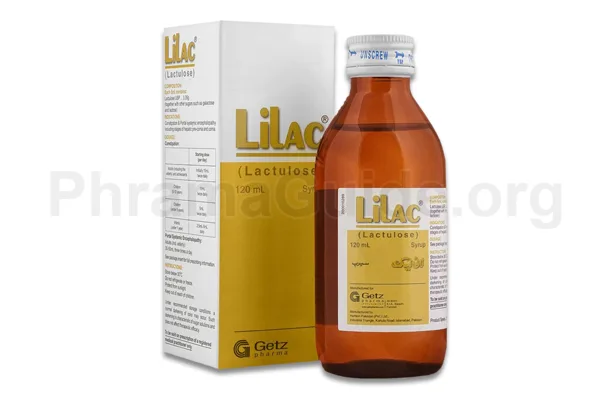Lilac syrup is a laxative medication primarily used for the treatment of constipation and to help regulate bowel movements. It is a synthetic sugar compound that helps to draw water into the bowel, softening the stool and increasing the frequency of bowel movements. The following are some common uses of Lilac Syrup:
- Constipation: Lilac syrup is primarily prescribed as a laxative to relieve and prevent constipation. It helps soften the stool and promotes bowel movements by increasing water content in the intestines. Lilac syrup is particularly beneficial for individuals who need to avoid straining during bowel movements, such as those with hemorrhoids or after certain surgeries.
- Hepatic Encephalopathy: Lilac syrup is also used in the management of hepatic encephalopathy, a condition that occurs when the liver is unable to effectively remove toxins from the blood. Lilac works by reducing the absorption of ammonia in the intestines, which helps lower blood ammonia levels. This can help alleviate symptoms such as confusion, disorientation, and changes in behavior associated with hepatic encephalopathy.
Off-label Uses of Lilac Syrup
- Preoperative Bowel Preparation: Lilac syrup may be used off-label as part of bowel preparation before certain surgical procedures or diagnostic tests. It helps clear the bowel by promoting bowel movements and emptying the colon.
- Treatment of Hepatic Disorders: Lilac syrup may be used off-label for the management of certain hepatic disorders, such as non-alcoholic fatty liver disease (NAFLD) and non-alcoholic steatohepatitis (NASH). It is believed that Lilac can help reduce the production and absorption of toxins in the gut, potentially benefiting liver health.
- Prevention of Diverticulitis: Diverticulitis is an inflammation or infection of small pouches (diverticula) that develop in the colon. Some healthcare professionals may consider using Lilac syrup off-label as a preventive measure to help soften the stool and reduce the risk of complications or recurrence in individuals with diverticulosis (presence of diverticula without inflammation).
- Gut Microbiota Modulation: Lilac syrup may be used off-label to modulate the composition of gut microbiota. It can act as a prebiotic, providing nourishment to beneficial bacteria in the colon and promoting a healthy gut microbiome.
- Management of Chronic Constipation in Children: Lilac syrup may be used off-label to treat chronic constipation in pediatric patients. The dosage and use should be determined based on the child’s age, weight, and specific needs, in consultation with a healthcare professional.

What is Lilac?
Lilac Syrup is one of the leading brands of Lactulose in oral liquid form, manufactured and marketed by Getz Pharmaceuticals (Pvt) Ltd, Pakistan.
Lilac Alternatives : Other Similar Brands
The following are some alternative brands of Lilac Syrup and their manufacturer.
- Duphalac : Abbott Laboratories, Pakistan.
- Laevolac : Hilton Pharmaceuticals (Pvt) Ltd, Pakistan.
- Floralac : Platinum Pharmaceutical (Pvt) Ltd, Pakistan.
- Lactodil : Don Valley Pharmaceuticals (Pvt) Ltd, Pakistan.
- Kolac : Asian Continental (Pvt) Ltd, Pakistan.
- B-Lact : Brookes Pharmaceutical Laboratories (Pvt) Ltd, Pakistan.
- Coslax : Cosmo Pharma, Pakistan.
- Sanlac : Novartis Pharma (Pakistan) Ltd.
- Luxave : Searle Pakistan (Pvt) Ltd.
- Dulac : (CCL) Consolidated Chemical Laboratories (Pvt) Ltd, Pakistan.
Lilac : Available Formulations and Strengths
Presently, Lilac is available in Syrup Form with the following strength.
Lilac Syrup : 3.35g/5ml strength.
Who Should Not Use Lilac?
Lilac syrup is generally considered safe for most individuals, but there are a few contraindications or situations where its use may not be appropriate. These include:
Allergy or hypersensitivity: Individuals who have a known allergy or hypersensitivity to lactulose or any of its components should avoid using Lilac syrup.
Galactosemia: Lilac syrup contains galactose, and individuals with galactosemia, a rare genetic disorder that affects the body’s ability to metabolize galactose, should avoid Lilac syrup.
Intestinal obstruction: Lilac syrup is contraindicated in individuals with suspected or known intestinal obstruction, as it may exacerbate the condition.
High-fructose corn syrup intolerance: Some Lilac syrup formulations may contain high-fructose corn syrup. Individuals with intolerance to high-fructose corn syrup should avoid those formulations.
Acute abdomen or appendicitis: Lilac syrup is contraindicated in cases of acute abdomen or appendicitis until an appropriate medical evaluation has been performed.
What is the Recommended Daily Dosage of Lilac Syrup?
Lilac Syrup Dose for Constipation in Adults:
- 15-30 ml (1-2 tablespoons), once daily.
- The dosage can be adjusted based on the response and individual needs.
Lilac Syrup Dose for Constipation in Children:
- 5-15 ml (1-3 teaspoons), daily.
How Lilac Works?
Lilac acts as an osmotic laxative by drawing water into the colon. The increased water content in the colon due to Lilac’s osmotic effect helps to soften the stool. This makes it easier to pass and promotes regular bowel movements.

Leave A Comment